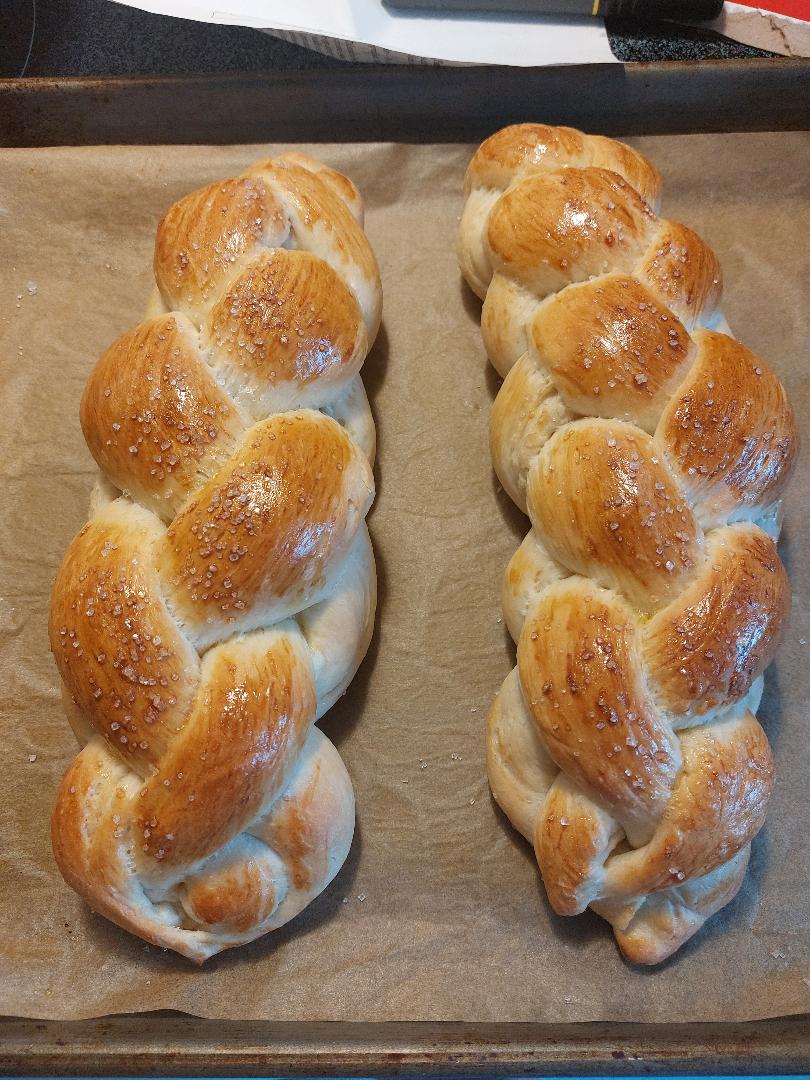
As Passover approaches, many of us are busy ridding our homes of chametz — bread and other leavened foods we traditionally set aside during this time. But for Janice Pleet, bread has remained at the heart of something much deeper: a way to nourish community and do good.
In the weeks following the October 7, 2023, attacks in Israel, Pleet was inspired by social media to embrace more mitzvot and deepen her Jewish practice. One of the ways she chose to do that was by baking fresh challah each week for members of Kehillat Beth Israel (KBI) attending Kabbalat Shabbat services. Her simple act of kindness quickly became a meaningful ritual — an offering of comfort and connection, one loaf at a time.
As we prepare for a holiday that asks us to let go of bread, the E-Bulletin thought it fitting to take a moment to celebrate the way bread — so often a symbol of Shabbat, community, care, and home — has helped one woman bring people together throughout the year.
"I happened upon a video by a Jewish influencer who calls herself the Challah Mom," said Pleet, who was surfing the web while trying to cope with the atrocities committed. "She suggested doing more mitzvot, such as keeping Shabbat, attending services, or baking challah."
After seeing this video, Pleet made the decision to bake challah every Friday. She has kept up with it, too, rarely missing a Kabbalat Shabbat unless she was unwell or out of town.
Deciding to take on baking challah was an easy choice for Pleet since she already enjoyed baking and cooking for others.
"If I've got an excuse to bake and take it somewhere, I'm really happy," she said. "Challah was new for me, though. I started with the recipe from the Challah Mom."
Challah is such an intrinsic food in Judaism. Unlike hamantaschen and latkes, which are eaten during specific times of year, challah is enjoyed year-round, every week (except for Passover).
Because it is such a fixture on Jewish tables, Pleet takes pride in her work, knowing that she will be feeding people for Shabbat and beyond, while also enjoying the fruits of her labour.
"Challah is always around," she said. "And it's a real pleasure to eat something that you've made as opposed to something that you bought in a bakery."
It is also a real pleasure for members of the shul to get a loaf of challah immediately following Friday night services. Pleet has even been told that some people are coming to shul to get a taste of her now-famous challah.
"People really look forward to coming to shul on Fridays because they know there will be challah," said Pleet. "It's a win-win for the shul, too, because they get their minyan and more."
As more and more people are learning about Pleet's offerings, news faces at KBI are also getting in on a weekly loaf.
"I happened to offer one to a new face," said Pleet. "As it turned out, he was in the process of converting and said how he hadn't tasted a challah in more than 25 years."
This excitement is the main reason Pleet continues to do what she does. Even though it is a laborious task to bake multiple loaves of challah every week, it is the look of satisfaction on the faces of those receiving the challah that makes it all worth the time and money.
While Pleet doesn't sell her challah and is keeping her operation on a smaller scale based at KBI, she is eager to share her bread with those at shul wanting to try some if there are extra loaves.
She also was happy to share the original recipe with her modifications, which can be found here.

